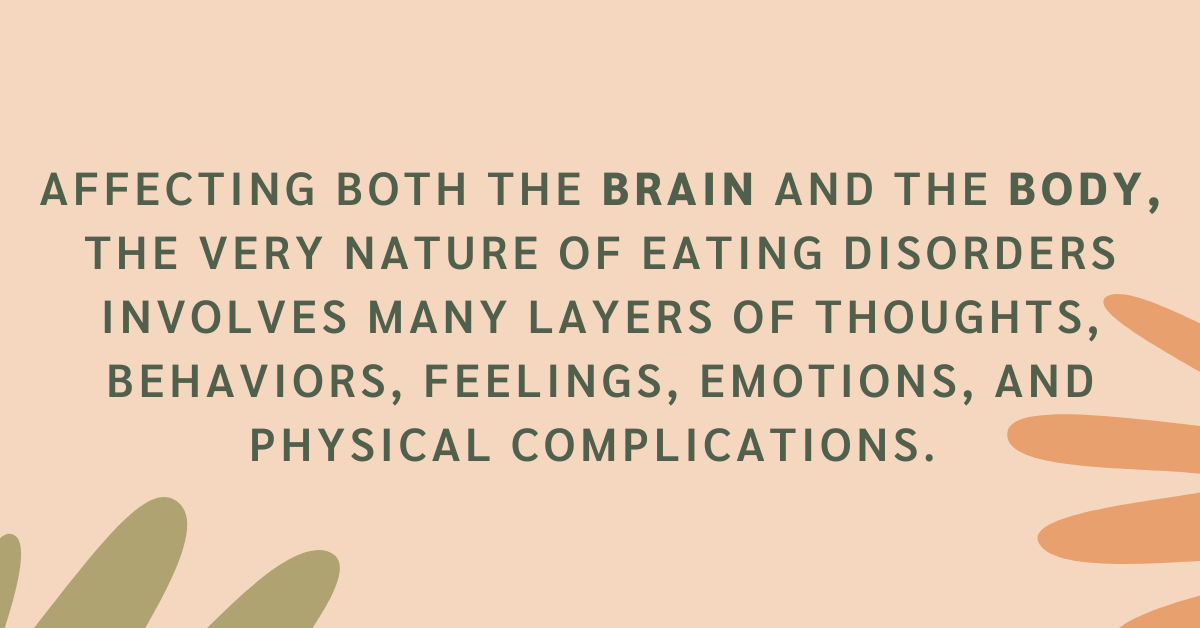Why Is a Treatment Team in ED Recovery Important?
Eating disorders are complex and multifaceted. They’re mental illnesses, and they have serious physical health consequences too.
Affecting both the brain and the body, the very nature of eating disorders involves many layers of thoughts, behaviors, feelings, emotions, and physical complications.
Due to this, the majority of cases are in need of a multi-disciplinary, integrative, collaborative team of professionals that are skilled in treating each aspect of the eating disorder.
Treatment can include medical care and monitoring, therapy, nutritional counseling, and medications.
It’s necessary for each member of the treatment team to be a specialist in eating disorders with an understanding of the psychological and physiological components. If they aren’t, more harm can result from the vast amount of misinformation and misconceptions surrounding eating disorders.
Goals of Eating Disorder Treatment
It’s important that the treatment plan is tailored to the individual for a personalized treatment approach. There are 3 broad areas of recovery:
Physical recovery: Restoration of the physical effects from the eating disorder. This includes bringing the individual to their own biologically appropriate body weight if necessary and normalizing electrolyte and hormone levels.
Behavioral recovery: Reduction and ultimately cessation of food restriction, excessive exercise, bingeing, and purging. Then, working towards regular and balanced eating habits and mindful, intuitive movement from a place of self-care.
Psychological recovery: Confronting and dealing with the cognitive and emotional aspects like poor body image, perfectionism, and body and food rules. Addressing co-occurring mental health concerns, too.
Types of Treatment Settings and Levels of Care
A variety of settings exist for eating disorder treatment. The severity of the eating disorder, available options, realistic financial factors, insurance providers, and personal circumstances all play a role in finding the right place.
Treatment settings include inpatient hospitalization, residential treatment, partial hospitalization, intensive outpatient, and outpatient. Some families also adhere to the maudsley approach, which is family-based treatment.
Stepping up and down among levels of care is common as the intensity of care can change based on the clinical presentation and needs of the individual.
It’s important to note that a certain treatment setting or a diagnosis or lack thereof does not define the severity and validity of what you’re going through. Someone who attends inpatient hospitalization is just as sick as someone who receives outpatient care.
Remember, eating disorders are mental illnesses and if you’re having food and body thoughts disrupt your life, you’re sick enough to receive help.
Early intervention is essential given the adverse impacts eating disorders have physically, mentally, socially, relationally, and occupationally. To prevent long-term suffering and greater consequences, it’s imperative to begin the process of recovery as soon as possible.
Members of a Treatment Team
The following are considered necessary members of a treatment team. Sometimes roles can overlap, but each team member has specific boundaries and areas of focus.
Medical Doctor or Primary Care Physician: Treats and manages the physical symptoms of the eating disorder.
Attends to medical complications
Medical monitoring of vital signs, blood work, bone density, etc.
Registered Dietitian: Provides nutrition and dietary advice and support to help the individual regain a positive and healthy relationship with food.
Evaluates individual’s nutritional status and current thoughts and behaviors regarding food
Counsels and educates on food and body topics
Creates individualized, structured meal plans based on needs, with the goal of transitioning the individual into eating intuitively
Helps to promote mindful, nourishing eating patterns
Participates in therapeutic meals for real-life learning and exposure
Gives guidance on exercise
Provides accountability and support in reducing and stopping eating disorder behaviors
Psychiatrist: Prescribes medications as required for treating mental health disorders such as obsessive-compulsive disorder, anxiety, and depression.
Focuses on the altered neurochemistry in the brain
Manages medication
Diagnoses mental health issues and addresses co-occurring disorders
Therapist: Involves an individual therapist performing different types of talk and behavioral therapy.
Establishes trust and a bond with the individual
Diagnoses initial areas of concern
Helps to address and process the connection between thoughts, feelings, behaviors, and symptoms
Addresses psychological roots underlying the eating disorder
Works with the individual to find new healthy ways to think and act
Aids in coping, self-growth, body image acceptance, relationships, and co-existing issues in the individual’s life
Can also include a family therapist, group therapist, and specialty therapists such as art or yoga
When the treatment team is working together in communication with each other, there’s more care and support, and less disruption, confusion, and distress. Each treatment team member also has the ability to educate and assist family and loved ones in their support.
Why Is a Treatment Team in ED Recovery Important?
Having a multidisciplinary treatment team in ED recovery is widely recognized as the standard of care and best practice.
It’s not possible for one person to be equipped to manage all aspects of an individual’s recovery alone. Having a skilled professional adhering to each area of the eating disorder allows every clinician to be the most effective in their specific role.
Adequate support and care are possible when the unique skills and responsibilities are taken care of by a professional that has been trained to do so. When a clinician oversteps out of their scope of practice, it’s considered unethical because they would be doing the individual a disservice with improper care.
Referring to other clinicians when it’s needed and having input from each team member makes for safe, successful, and comprehensive care.
Treatment that’s performed by a collaborative team allows for the different components of treatment to work together. Progress in one area can enable and support progress in other areas. For example, when an individual is malnourished, it’s very difficult to participate and focus in therapy sessions. When the individual begins to properly feed themselves again, their brain can more easily take part in therapy.
A treatment team also allows the family members and loved ones to remain in their respective roles. They can support the individual without having to feel like they need to be the “food police,” which can be left to the professionals.
Having a well-coordinated team that’s dedicated to helping the individual heal from the eating disorder is a major component of lasting recovery!
Connect with an Eating Disorder Therapist
If you are in search of a therapist who specializes in eating disorders, disordered eating, and healing your relationship with your body, please feel free to visit my website or email me to see if working together might be a good fit for you. My office is based in Salado, Texas, and I can provide virtual therapy services across the state of Texas.
Good on therapy? Great! I also have a weekly newsletter called Sunday Soothies you might be interested in signing up for. If you ever get a case of the Sunday Scaries, cozy up with your inbox every Sunday morning and soothe your way into your week! Join the Soothie Crew here.


